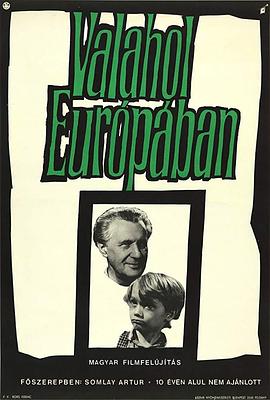简介
Somewhere in the remote region, the war ends. In the midst of ruined cities and houses in the streets, in rural hamlets, everywhere where people still live, are children who have lost their homes and parents. Abandoned, hungry, and in rags, defenseless and humiliated, they wander through the world. Hunger drives them. Little streams of orphans merge into a river which rushes forward and submerges everything in its path. The children do not know any feeling; they know only the world of their enemies. They fight, steal, struggle for a mouthful of food, and violence is merely a means to get it. A gang led by Cahoun finds a refuge in an abandoned castle and encounters an old composer who has voluntarily retired into solitude from a world of hatred, treason, and crime. How can they find a common ground, how can they become mutual friends The castle becomes their hiding place but possibly it will also be their first home which they may organize and must defend. But even for this, the price will be very high. To this simple story, the journalist, writer, poet, scriptwriter, movie director, and film theoretician Béla Balázs applied many years of experience. He and the director Géza Radványi created a work which opened a new postwar chapter in Hungarian film. Surprisingly, this film has not lost any of its impact over the years, especially on a profound philosophical level. That is to say, it is not merely a movie about war; it is not important in what location and in what period of time it takes place. It is a story outside of time about the joyless fate of children who pay dearly for the cruel war games of adults. At the time it was premiered, the movie was enthusiastically received by the critics. The main roles were taken by streetwise boys of a children's group who created their roles improvisationally in close contact with a few professional actors, and in the children's acting their own fresh experience of war's turmoil appears to be reflected. At the same time, their performance fits admirably into the mosaic of a very complex movie language. Balázs's influence revealed itself, above all, in the introductory sequences an air raid on an amusement park, seen in a montage of dramatic situations evoking the last spasms of war, where, undoubtedly, we discern the influence of classical Soviet cinematography. Shooting, the boy's escape, the locomotive's wheels, the shadows of soldiers with submachine guns, the sound of a whistle—the images are linked together in abrupt sequences in which varying shots and expressive sharp sounds are emphasized. A perfectly planned screenplay avoided all elements of sentimentality, time-worn stereotypes of wronged children, romanticism and cheap simplification. The authors succeeded in bridging the perilous dramatic abyss of the metamorphosis of a children's community. Their telling of the story (the scene of pillaging, the assault on the castle, etc) independently introduced some neorealist elements which, at that time, were being propagated in Italy by De Sica, Rossellini, and other film artists. The rebukes of contemporary critics, who called attention to formalism for its own sake have been forgotten. The masterly art of cameraman Barnabás Hegyi gives vitality to the poetic images. His angle shots of the children, his composition of scenes in the castle interior, are a living document of the times, and underline the atmosphere and the characters of the protagonists. The success of the picture was also enhanced by the musical art of composer Dénes Buday who, in tense situations, inserted the theme of the Marseilaise into the movie's structure, as a motive of community unification, as an expression of friendship and the possibility of understanding. Valahol Europaban is the first significant postwar Hungarian film. It originated in a relaxed atmosphere, replete with joy and euphoria, and it includes these elements in order to demonstrate the strength of humanism, tolerance, and friendship. It represents a general condemnation of war anywhere in the world, in any form.
猜你喜欢
-
更新至30集
仿妆
主演:陈欣予,管栎,权裴伦,徐轸轸,史卿妍,吴海,冷巴,凌轩 -
HD
蜂巢2024
主演:Jalisa,McFat,Rese,Cheri,Madison,Warren-Coombs -
更新至17集
宫墙厌
主演:何宣林,程宇峰,王星凯,关昱汐,权书娴,谢庚沄,媛梦 -
更新至24集
白日梦与她
主演:王紫璇,唐晓天,金泽,冯韵之,张昊玥,龚芳妮,路宏,蒲萄,卜凡,孙子航,周小川,祁圣翰,薛宇槟,田栩宁 -
更新至07集
海军罪案调查处:悉尼第二季
主演:奥利维亚·斯万,托德·拉桑斯,肖恩·萨加尔,马沃尼·黑泽尔,Tuuli Narkle,威廉·麦克因斯 -
更新至44集
武炼巅峰
主演: -
更新至04集
属于我们的城市
主演:肖恩·宾,詹姆斯·尼尔森-乔伊斯,汉娜·昂斯洛,杰克·麦克马伦,朱莉·格雷厄姆,劳拉·艾克曼,凯文·哈维,希尔莎-莫妮卡·杰克逊,迈克·诺布尔,鲍比·斯科菲尔德,达茜·肖,斯蒂芬·沃尔特斯 -
更新至08集
华生
主演:摩里斯·切斯塔特,伊芙·哈洛,因加·施林曼,Tommy O'Brien,香农·贝里,Alessandro Pekin,Jean Zarzour,莱斯莉·米尔扎,Anita Alfke,Julia Koon,Camila Canó-Flaviá,Bethany Brown,Lauren Attadia,Ciara Mandel,Arash Ghorbani,彼得·马克·肯德尔,里特奇·科斯特,罗谢尔·阿耶斯,菲尔·纳多兹 -
HD
破·地狱
主演:黄子华,许冠文,卫诗雅,朱栢康,周家怡,秦沛,金燕玲,韦罗莎,梁雍婷,白只,钟雪莹 -
更新至09集
协商的技术
主演:李帝勋,金大明 -
更新至14集
宝物岛
主演:朴炯植,许峻豪,李海荣,洪华妍,禹贤,金贞兰,都知嫄,张素妍,权秀贤,韩智慧 -
更新至10集
值得爱
主演:王安宇 , 王玉雯 , 黄子琪 , 赵佳丽 , 张帆 , 杨昀昊 , 耿乐 , 张宥浩 , 孙嘉灵 , 程莉莎 , 郭晓东


